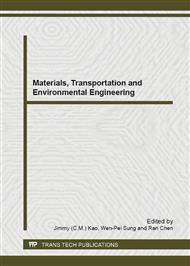p.1596
p.1600
p.1607
p.1613
p.1619
p.1623
p.1629
p.1634
p.1639
Improved Fuzzy Equilibrium Average Type Comprehensive Evaluation Method in the Application of Water Quality Evaluation
Abstract:
In order to improve the traditional fuzzy comprehensive evaluation model of main factors, the paper used the shortage of the outstanding balance average type instead of traditional fuzzy comprehensive evaluation method in the evaluation process and takes big or small algorithm, this method to avoid maximum membership principle may cause information loss, more objective quantitative determination of water quality class. This paper Liaozhong waterfront city underground water quality testing data as the basis, an improved fuzzy comprehensive evaluation method to evaluate, the result is due to the area of iron and manganese from groundwater seriously overweight cause groundwater quality grade V. Show that the method of water quality evaluation, the result more objective and accurate.
Info:
Periodical:
Pages:
1619-1622
Citation:
Online since:
September 2013
Authors:
Price:
Сopyright:
© 2013 Trans Tech Publications Ltd. All Rights Reserved
Share:
Citation:


